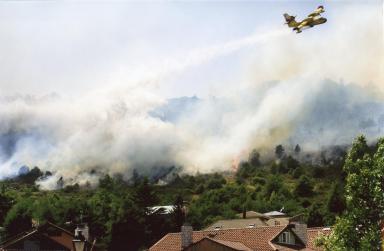

Spain is preparing for wildfires that are increasingly intense and aggressive
Rural depopulation, the effects of climate change and the so-called “fire paradox” are causing wildfires to be increasingly intense and aggressive. With the advent of summer, the risk is again high, also taking into account that the year has been quite dry so far, which complicates prevention and fighting even further. Experts warn of the evolution of these phenomena.
Climate change increases the risk of wildfires every year, and aggravates their nature, which makes it more of a priority to prevent them and makes it harder to put them out, as explained by Ramón María Bosch, coordinator of the Committee for Wildfire Defence of TECNIFUEGO, the Spanish Association of Companies for Fire Protection. “If we add to this that this year has been quite dry, the fire hazard is very high, therefore we must take extreme precautions”.
For Pedro Alfonso Buldón, instructor and teacher of Emergencies and Civil Protection for Vocational Training, a specialist in wildfires and a forest agent, drought is also an important element, both in the prevention and in the fighting of wildfires, and one of the effects of climate change. “It directly affects vegetation, making it easier to catch fire and enabling the fire to spread quickly, and this means that we have to work harder to fight against many of these wildfires”.
The water stress that the vegetation undergoes increases with the heat waves, which we call “Saharan”, masses of hot air that enter the Peninsula and remain for several days, which along with the wind, make wildfires much more difficult to contain. According to Buldón, “right now the situation is somewhat more favourable than last year, but we can't let our guard down, because this could quickly change as summer sets in, and the campaigns are longer every year”.
How to get ready for the season
In this new setting of aggravated hazards, experts advise on how we can prepare for the upcoming wildfire season. Ramón María Bosch (TECNIFUEGO) proposes trying to minimise the risk: “On the one hand, and as long as the authorities allow forest work, by clearing the countryside by means of perimeter safety strips, pruning, tilling, animal grazing... although by now most of this work should have been already completed; and on the other hand, when we reach the high temperatures, by minimising or forbidding any forest activities that entail a fire hazard, especially during the hottest hours of the day, such as weed clearing, cutting trees and other agricultural work”.
He also recommends “having the fire-fighting teams equipped with good tools that are in perfect condition; fire-fighting trucks, hoses, water cannons, airplanes, fire retardants, etc.”
Pedro Alfonso Buldón explains that “it is hard to predict what this wildfire campaign will be like”, but he adds that “at the moment it begins with the progressive coming out of lockdown, and the vegetation remains left behind by the storm Filomena, variables that we did not have in previous years”. And he warns that “the fact that branches are hanging from the trees provides the continuity required for a wildfire to become even more complicated, spreading from shrubs to treetops in a matter of minutes”.
In this expert's opinion, “rural depopulation, the effects of climate change and what we call “the fire paradox” will make wildfires increasingly more aggressive and intense, the so-called sixth-generation fires”.
Buldón said that “we can expect a somewhat quiet beginning. The situation is a bit more favourable than last year, there are technical variables that show this, but things can get complicated with the cereal harvest and the progress of summer”. The situation “will depend on the heat waves that we experience and any possible exceptional weather episodes”. Notwithstanding, he says that “the various autonomous community and national teams are ready, with all of the available resources, and in areas of special protection even with increased resources”.





